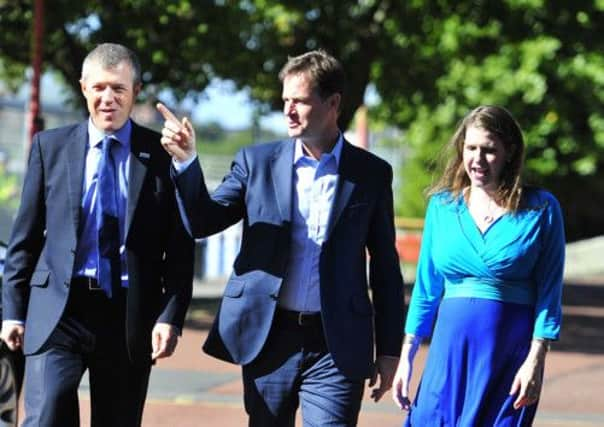Glasgow is battleground for Lib Dem heart and soul


Whether it is motions to legalise cannabis, or for 16-year-olds to be allowed to do porn, or getting very cross about that broken promise on tuition fees, the sandal-wearing brigade rarely holds back.
The leadership usually sighs and tells journalists that it’s all about what the party says on the tin, in other words the democratic bit of being Liberal Democrats. But, given this tradition of conference humiliations, it was perhaps a little foolhardy of Deputy Prime Minister Nick Clegg to put down a motion calling on the party to get behind the austerity programme and say how jolly well Lib Dem Chief Treasury Secretary Danny Alexander has done with his Tory pal, Chancellor George Osborne.
Advertisement
Hide AdAdvertisement
Hide AdClearly, the intention was to show a party focused and fit for government in a conference that starts the “long campaign” to the general election in 2015. Nobody appears to have told the rather hurt, woolly, left-leaning membership, which is anything but happy with drastic cuts to welfare, cutting the top rate of income tax, cutting council funding and, in fact, most of the economic policy. This is why Clegg had to take the unusual step of speaking himself to try and stave off defeat. While Alexander is rated as a minister, he has yet to set an audience alight with his oratorial skills.
But there is a much bigger problem here than the usual conference embarrassment for the leadership. The initial refusal of Business Secretary Vince Cable to defend an economic policy he supposedly helped shape tells the story. It is no accident that his friend Lord Oakeshott started conference season by calling for Cable to replace Clegg as leader. While a challenge is unlikely, it cannot be totally ruled out – although, neither can Cable being removed from the Cabinet in a reshuffle.
There is much more going on here than a disagreement over coalition policy, or even over who should lead the party, and certainly it is much greater than another embarrassment for the leadership at a conference. This is the latest chapter in a struggle for the very soul of the Lib Dems, which began in 2004 with the publication of the Orange Book by right-leaning, ambitious young MPs who wanted the party to move from the fringes of mere protest to being fit for government.
Orange Bookers include Clegg, Alexander and the book’s editor, now children’s minister, David Laws, arguably the three most influential Lib Dems in government. While they have turned their party into one of government and had successes, they have never chimed with the social conscience of the membership, which has been hurt by the pact with the Devil, as they see it, otherwise known as coalition with the Tories. Cable meanwhile represents the social conscience, a comfortable place for Lib Dems. What is happening in Glasgow is the start of a process over which side will hold sway after the election in 2015.